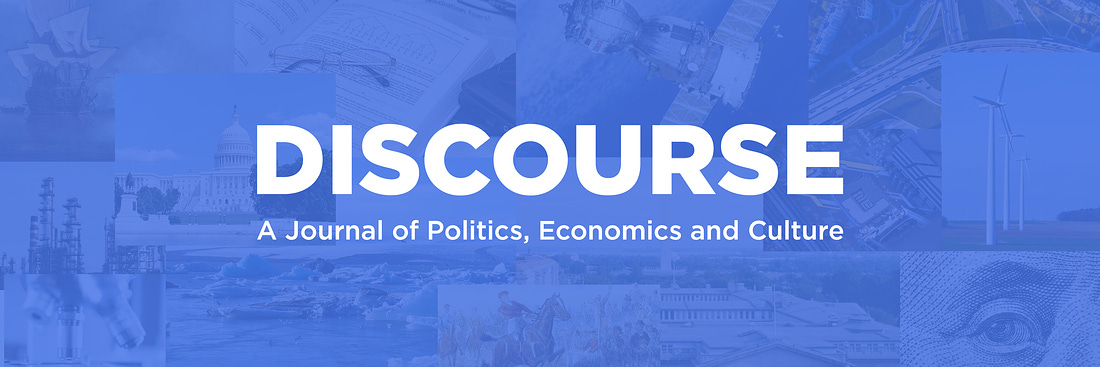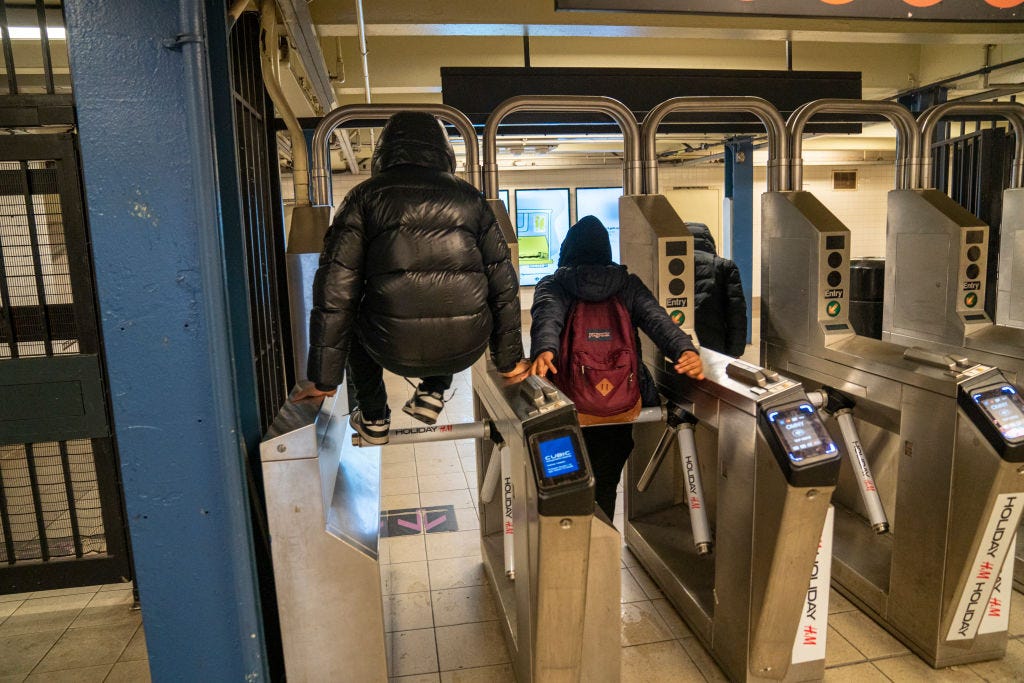|
 |
Is driving over the speed limit a big deal? How about jumping over a turnstile at a subway gate, so you don’t have to pay the fare? Are your answers to these questions the same, or do they differ? The arguments I frequently see over fare evasion and speeding—two different offenses, largely committed by different people—really get at how we do or don’t think about crime, in a deep sense.
It bothers me how frequently drivers endanger themselves and others, and it bothers me that road design and traffic engineering effectively incentivize irresponsible driving. But it also bothers me how tolerant a lot of urban progressives are of low-level lawbreaking. Stopping fare evasion is the lowest of low-hanging fruits. You don’t have to arrest anybody—I don’t think you should, in fact. You don’t have to manhandle or tackle or tase anybody. You simply have to treat fare evasion as a low-level civic infraction—like moderate speeding on the highway, or parking illegally or overstaying a spot—and have a relatively low but reasonably expected fine.
That is the policy, for example, of the D.C. Metro, which threatens fines of $50 to $100. Yet I’ve seen people oppose even this, which is still a far cry from what then-mayor Rudy Giuliani famously did in New York City in the 1990s: arrest fare evaders, run their records and lock many of them up.
There are “bigger fish to fry”—fare evaders aren’t hurting anybody; fining fare evasion is criminalizing poverty; motorists pose much greater dangers. You won’t always find people excusing fare evasion, exactly, much less actually condoning it. But you will find them resisting the enforcement of the rules, or expressing a measure of discomfort with it.
One of the frequent arguments in response to concerns over fare evasion is that maybe public transit should just be free. Ticket infrastructure, fare-gate maintenance and, of course, enforcement all cost money, after all.
If free fares are financially workable for transit agencies—a big if—I have no problem at all with it. The principle is not make people pay. Rather, the principle is don’t steal. Some garage sales put the leftovers on the curb for free at the end of the day. Does that mean a customer is entitled to just walk out with one of those items during the sale?
This is one of those things that gets down to philosophical differences. It appears that some progressives genuinely see no difference between jumping the gate and walking into a fare-free system. I think the difference is crucial. Almost metaphysical.
Fare evasion is low on the list of things that concern me. But it is irksome to see people freely skipping the fare. It is unpleasant to be reminded that paying is optional if you don’t have a moral compulsion to pay. It turns “this is the price” into something like “pay what your conscience tells you to pay,” and it turns your conscience into a liability. People don’t like being made to feel like suckers. That is a pretty hardwired sentiment. If you don’t like human nature, take it up with God.
The Kinds of Crime
What kind of offense is fare evasion? Pinning this down is one of the trickier elements of working through questions of enforcement and punishment.
Most of the right-leaning suburbanites I know consider it to be theft, in the same category as shoplifting or, well, stealing something. Obviously, it is a small amount. But the type of offense they understand it to be feels serious.
Many of the same people, however, would generally consider speeding to be quite minor; certainly not criminal. Some would even view certain traffic violations as a sort of protest against the overbearing state. Libertarian intellectual Matthew Crawford suggests this in his book “Why We Drive,” in which he writes of the glories of splitting lanes on his motorcycle, or wheedling his way out of tickets.
Perhaps a majority of motorists view the whole panoply of traffic violations—overstaying a parking spot, speeding, failing to fully stop at a stop sign, gunning it at a yellow, even speeding through a crosswalk in which there is still a pedestrian—to be very minor, almost necessary offenses. They are simply a part of getting where you’re going in a car.
On that, they might be right.
Urbanists, transit advocates and pedestrian safety advocates, on the other hand, frequently view the offenses committed by motorists as very serious. Some of them even consider driving to be inherently a little bit wrong, regardless of how responsible the driver is. Motorists routinely come close to killing people. They often actually do. They destroy property. They impose, and come close to imposing all the time, real injury and real harm. Cars kill roughly 40,000 Americans a year. How is that remotely comparable to failing to pay a couple bucks at the subway station?
I can understand both the objection to widespread stealing and to the widespread endangerment of other people. But why do they have to be equal offenses in order for both to be dealt with?
It does strike me as a bit odd and improbable, though, that it would just happen to be the case that the transit rider’s low-level crime is a far more serious offense than the motorist’s. Maybe reality simply decrees that the minor offenses committed by urbanites and transit users are somehow inherently more serious than those committed by everyone else. Or maybe it’s America’s deep anti-urban bias—in turn impossible to disentangle from our country’s racial history—that makes this feel true.
Perhaps speeding is an inapt comparison to fare evasion. Many people object specifically to the element of theft in it. What, then, about overstaying a parking meter? Sneaking into a second movie? Downloading a song you didn’t pay for? Forgetting about the income from a garage sale when it comes time to do your taxes? Taking a hidden egg roll out of the all-you-can-eat buffet so you can have a snack later? Grabbing a hotel breakfast when you’re not actually staying at the hotel? (Did you ever think of that one?) These are not any more or less “theft” than skipping the transit fare. But I would guess, to most people, they just feel different.
Maybe it’s just that we are more tolerant of the infractions we can imagine ourselves committing. We don’t want to judge too harshly our potential selves. We don’t want to think that we’re the sort of people who commit actions that might be considered “criminal.”
I’m No Criminal ... Or Am I?
Let me share a little anecdote along these lines. On a Facebook group for my hometown of Flemington, New Jersey, I saw a post about our old speedway. A number of older folks were reminiscing about sneaking into the speedway without tickets to watch races. You’ll see the same kind of nostalgia on these group pages over the antics that then-teenagers got into in restaurant kitchens where they worked, or how they sneaked into R-rated movies, or how they tried to conceal beer in a car or what have you.
I would guess that many of these people would characterize fare evasion as a different sort of thing than this old childhood mischief. One is just that: mischief, antics. The other is criminality. There is some invisible line between them. Enforcement, arrest, ticketing, jail are always for other people, for other kinds of offenses. Crimes are not the sort of offenses I commit, because I’m not a criminal. Crimes are things only certain kinds of people do.
I noted above that widespread low-level lawbreaking can make people who don’t partake feel like suckers. But the thing is, maybe they will partake. See a lot of something, and you become curious. The logic seems sound to me, and not just theoretically: I can see it in myself.
Whatever small amount of mischief I have gotten into, I’ve never jumped a fare-gate or stolen anything from a store. But I’ve certainly thought about it. How much could I get away with? I can imagine seeing it as a sort of game. Especially if my friends had played that game too. Kids tend to imitate each other.
I can imagine that it is my faith or my virtue—my belief that stealing is wrong—that keeps me on the straight and narrow. But is it? I also have a bachelor’s and a master’s degree, and a wife and a career. I have a reputation. Horizons encourage success, and success raises the cost of mischief. I have a lot to lose. Even if I had no moral qualms at all about committing crime, it would be rational for me to remain law-abiding.
If crime cost me a lot less, do I know that I wouldn’t have turned out differently? The notion that criminals are a type of person, a fixed thing, not only contradicts what we know about people’s capacity to get clean and reform themselves—or to dabble in mischief and then grow up, like those baby boomers on Facebook whose own flirtations with lawbreaking are nothing more than fond and distant memories. Should they have been thrown into the criminal justice system? And should today’s fare evader be spared? On what basis would you argue “no” and “no”?
The hardest law-and-order rhetoric is not only frequently lacking in empathy or introspection. It is also profoundly un-Christian—not just in the sense that it denies charity to “criminals,” but in the even deeper sense that it imagines its protagonists to be somehow immune from sin. The core of Christianity is that we are all fallen and sinful, and that all of us have the capacity to commit evil. When we dismiss entire classes or demographics as fixed entities, we are not only being uncharitable. We are whistling past the graveyards of our own souls.
If we imagine that we are morally immune to certain kinds of temptations and wrongdoings—that virtue is inherent in us—we ignore and fail to credit the things that actually helped us to learn and practice these better habits. To imagine that we were simply born virtuous is the moral equivalent of being born with a silver spoon in one’s mouth.
The idea that our circumstances can substantially shape our values and who we are strikes some conservatives as a denial or downplaying of human agency or individual responsibility. It is more comfortable to conclude that some people are simply lawless than it is to conclude that we might have been ourselves.
The overlap between mischief and antics, mistakes and crimes is subtle. It is less important to rank offenses in the “right” order than it is to promote order, reject widespread lawbreaking of any sort as a status quo and practice charity and understanding. Easier said than done—as are most things worth doing.
You’re currently a free subscriber to Discourse .

